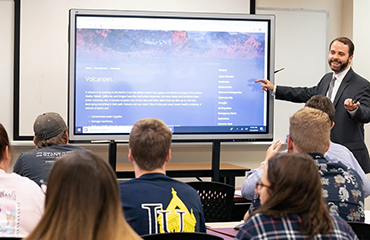
A tornado in March ripped through central Tennessee, killing 24 people and bringing a swath of destruction to homes and businesses.
Wildfires in California in the summer of 2019 consumed more than 255,000 acres of land, killed five people and destroyed wildlife. In September, Hurricane Dorian reached Category 5 status when it unleashed its fury in the Bahamas before heading to the United States where it caused more than $1.2 billion in damage.
Now, the COVID-19 pandemic has caused disease and deaths around the world. Government officials, healthcare workers, public health professionals, emergency responders and the public are struggling to slow - and ultimately eradicate -- the spread of the virus.
Each disaster has its own specific characteristics, but all have a common link, said Dr. Matthew Malone, an assistant professor of political science and Homeland Security in Lander University's Department of Government, Criminology & Sociology.
The link is emergency managers who work before, during and after "the storm" to bring together the necessary people and resources to prepare for potential crisis, to mitigate potential damage and suffering and to plan for future needs.
"Emergency managers are on the front line from start to finish," said Malone, who leads the master's degree program in emergency management at Lander University.
The online program, which is the only one of its kind in South Carolina. isn't only for people who are emergency managers, although two of South Carolina's county emergency managers are graduates. The program has had students with careers as varied as first responders, healthcare professionals, governmental administrators and public relations.
The program offers six core courses, and students choose four electives suited to their areas of interest. They also complete a capstone project tailored to their specific career goals, said Malone, the Emergency Management Program coordinator.
"This is a career-driven program with broad appeal. Some students may be interested in changing careers or getting a first career or enhancing their skills for a current job," he said. "Career opportunities are wide open."
The Federal Emergency Management Agency has a shortage of at least 2,000 personnel to respond to disasters. The U.S. Bureau of Labor Statistics estimates that the number of jobs in the field of emergency management is projected to grow by 8 percent through 2026, which is higher than average job growth for many other careers.
While emergency managers at local, state and national levels may not have specific resources within their departments to deploy in times of need, their job involves working with those who do have the necessary resources, including governmental agencies, hospitals, law enforcement and other service providers.
COVID-19 is a test case in emergency management because of the underlying uncertainty regarding the disease and the overwhelming impact it is having on the economy and health systems, he said.
"However, the WHO and other healthcare organizations provide guidance and best practices for planning and responding to challenges. Then, emergency managers coordinate with public health professionals and other leaders to determine how all of the demands will be met and how and where resources will be allocated," Malone said.
Each event, whether it is a fire, tornado, hurricane, flood, disease or manmade disaster, has its own specific needs and unique challenges, but emergency managers are the ones with the skills to bring the necessary experts together to make decisions and mitigate the situation. After the fact, emergency managers will assess what happened and what plans should be developed for the future.
"Preparedness is essential for mitigation, response and recovery," said Malone, "and emergency managers are vital in these efforts. Lander's program is educating the future leaders who will serve our communities, state and nation."
Visit www.lander.edu/emgt to learn more.